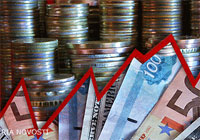EBRD Chief Sees Opportunity in ‘Sluggish’ Russia

(Moscow Times – themoscowtimes.com – September 24, 2013) EBRD president Suma Chakrabarti acknowledged Tuesday that Russia’s sputtering economy combined with deeply ingrained problems such as corruption and a weak court system were deterring both foreign and domestic investors.
But he insisted that the opportunities continued to far outweigh the risks and said the Russian authorities were taking much-needed steps to improve the business climate.
“At the EBRD we are aware of how difficult it is to wheel around entrenched cultures. But we are optimistic about the longer term outlook,” Chakrabarti told investors at the Russia-Singapore Business Forum in Singapore.
“In Russia, steps are already being to improve the investment climate. We see a number of Russian regions successfully lowering administrative barriers and creating a climate that attracts both foreign and Russian investors,” he said, according to an e-mailed transcript of his remarks to a panel discussion.
The European Bank for Reconstruction and Development, established to assist the former Soviet Union and Soviet bloc countries transit to market economies, is the single largest foreign investor in Russia outside of the oil and gas sector, plowing 23 billion euros into more than 700 projects in the past 22 years.
Chakrabarti said the EBRD was proud of its work in Russia and believed that the country today contains “vast investment potential” because significant economic gaps remain between its economy and those of more developed markets.
“There is huge pent-up demand for consumer goods. There is an expanding middle-class with growing spending power. Real disposable incomes are rising. Consumers are becoming more sophisticated. They want higher quality products that cannot always be sourced locally,” he said.
“This provides an opportunity, both for exporters to Russia as well as to investors who want to move into Russia and start production or to increase the presence they already have.”
Chakrabarti said this opportunity was complimented by the Russian government’s stated desire to reduce the economy’s dependence on oil, gas and other raw materials.
But, he said, Russia’s path toward transforming its economy has been and remains difficult, “with incremental progress often followed by halting retreat.”
“Russia is now in the midst of such a setback,” he said. “The economy is experiencing sluggish growth. FDI has slowed down over the last several years, and the flow of capital has swung into reverse.”
Russia’s economy, which posted modest growth of 3.4 percent in 2012. slowed down to just 1.4 percent in the first six months of this year. At the same time, foreign investors have looked elsewhere to make money, and Russian investors have funneled their cash abroad.
“In Russia, in other parts of the CIS and in much of the emerging world, slow growth is linked to investors’ perception of investment conditions,” Chakrabarti said. “Across the board, there is a strong need to improve the business climate to dismantle the barriers to investment.”
Chakrabarti singled out corruption as a major barrier, adding that investors also were deterred by bureaucracy and the court system, which is “seen as unfair and arbitrary and as often pursuing political rather than independent judicial objectives.”
But those factors should not stop investors from taking a chance on Russia, he said.
“It is important to choose projects carefully. It is important to choose partners carefully. There is no substitute for doing your homework,” he said. “But we are convinced that the opportunities outweigh the risks.”
